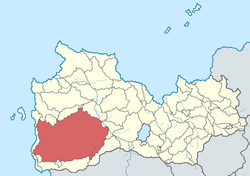Zalykia
This article is incomplete because it is pending further input from participants, or it is a work-in-progress by one author. Please comment on this article's talk page to share your input, comments and questions. Note: To contribute to this article, you may need to seek help from the author(s) of this page. |
Zalykia
| |
|---|---|
 | |
| Country | Soravia |
| Capital | Yalmta |
| Government | |
| • Body | Grand Khural |
| • Chairman | Khermen Osor (PF) |
| Area | |
| • Total | 247,822 km2 (95,685 sq mi) |
| Population (2023 census) | |
| • Total | 5,375,335 (–0.5%)[1] |
| • 2008 census | 5,400,182[2] |
| Postal code | 70xxxx |
| Dialling code | +72 700 |
Zalykia (/'zɑːlɪkiə/, Soravian: Заликія; Zalykiya pronounced [zɐlʲɪ'kijɐ], Zalyk: Зальг Таңһч; Zal'g Tañḥch) is one of Soravia's five autonomous republics and its largest top-level subdivision by area. The Great Western Plain makes up much of the province's land area and supports its high rural population. Its government is the devolved Grand Khural currently led by Khermen Osor of the Patriots' Front, and is administrative centre is located in Yalmta, while its largest city is Charkasar.
Zalykia was first inhabited by small Marolevic tribes, but were pushed eastwards as Zalyks began to settle the area during the Tagamic migrations. Early Zalyks followed Badi and established a Khanate in the 9th century, raiding and plundering villages in the Pavatrian veche of the Great Vesemir. When Pavatria declared its independence from the Vesemir and Hippodalia converted Nuruk to Sotirianity in 939, the Badist faith of the Zalyks began to be syncretised with Episemialist Sotirianity. Pavatria and Zalykia experienced intermittent conflict with each other until the latter was decisively defeated by Nikolai of Lipa at the Battle of Usaanbalsan. Cultural and religious assimilation followed the conflict as Pavatria gradually annexed the entirety of Zalykia into its borders.
The province experienced relative decline under the Soravian Empire as neglect from its rulers affected the local economy. Its ports were rarely subsidised and fell out of favour for ports such as Samistopol and Luchintsy, where much of the country's trade entered and exited. Minor Zalyk colonial migrations occurred over the 17th and 18th centuries to Chistovodia and Vinalia, and exist in small populations today. The region was badly affected by the Great War and endured large-scale destruction of property and land as a result of the conflict. Tagai Chulgetei attempted to achieve independence for Zalykia under a socialist framework in the 1980s, but was unsuccessful. The modern republic of Zalykia was established in the 1983 administrative reforms.
The Zalyk economy is primarily agricultural, with resource industries in its largest cities. It also contains a significant amount of landmarks, relics and artefacts relating to Tagamic and Zalyk culture, and old Zalyk buildings and shrines can be found in cities throughout the province. The province is also attempting to expand its influence in the tourism market, with its warm coasts providing ideal circumstances for the construction of beach resorts in its coastal cities.
Name
History
Geography
Voivodeships
Cities
Demographics
Climate
Transport
Economy
See also
- ↑ "Статистика населення за переписом 2023 року: Заликія" Soravian National Statistics Institute (ZNIS). 24 June 2023.
- ↑ "Статистика населення за переписом 2008 року: Заликія" Soravian National Statistics Institute (ZNIS). 19 July 2008.
